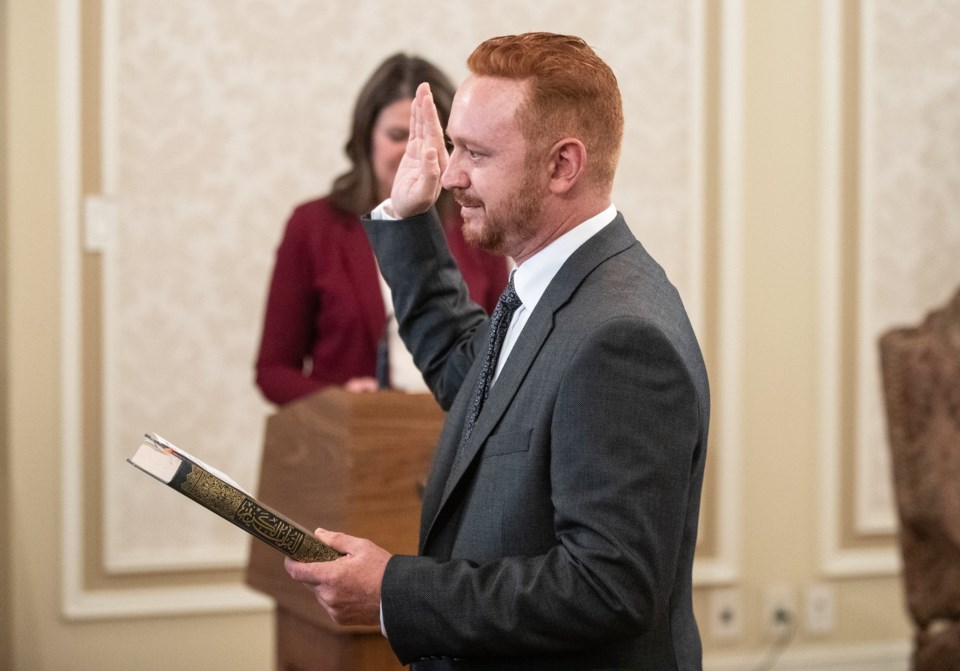EDMONTON — Two of the Alberta Law Foundation's three provincially appointed board members have resigned in protest over proposed legislation that they say amounts to political interference in how vulnerable people access the justice system.
The bill would give Justice Minister Mickey Amery final say on grants over $250,000 that the foundation provides to community legal clinics and researchers. The grants are funded through interest earned on lawyers' trust accounts, not government coffers.
Executive director Byron Chan said Thursday the $250,000 threshold applies to nearly all of the foundation's grants, meaning the bill presents a "fundamental shift" in how community legal services would be funded in Alberta.
Board member Seun Ogunsola said in his resignation letter that the government is stripping the foundation of its independence and undermining its work.
The province also isn't waiting for the legislation to pass. Ogunsola said Amery has vetoed $10 million in grants since the bill was tabled a month ago.
The foundation's most recent annual report says it gave out almost $21 million in grants in the 2023-24 fiscal year.
"To ensure a fair, just and accessible legal system in Alberta, it is imperative that it operates independently from any external interference," wrote Ogunsola, who was appointed to the board by the United Conservative Party government in 2021.
"With the board’s independence significantly diminished and my capacity to support and advance initiatives that truly serve the public interest without interference now compromised, I have made the difficult decision to tender my resignation."
Ogunsola called the bill a "serious threat" to organizations that the foundation funds and to the Albertans who rely on legal assistance those organizations provide.
Dawn-Lyn Blake, appointed to the foundation's board in 2023, said in her own resignation letter Thursday she was stepping down because the change has stalled the creation of an Indigenous law institute at the University of Alberta, "blocking a significant investment in Indigenous legal education, research and reconciliation."
The Canadian Press was unable to reach Ogunsola or Blake, but Chan said the board members didn't make their decisions lightly.
"These are respected professionals and leaders in our community who believe in the foundation's mandate and in a justice system that puts people and principles above politics," he said.
"We share their grave concerns. And we echo the call for the government to reconsider this path before more damage is done to the justice system's independence, to public trust and to countless individuals and communities across Alberta."
In an email, Amery thanked the board members for their service and said he was looking forward to working with future board members.
"Albertans expect, and Alberta’s government is committed to provide, robust oversight of public interest dollars," Amery said, adding his involvement is necessary to ensure the foundation is financially stable.
He said his recent rejection of grants has been "unfairly and inaccurately mischaracterized" by the foundation. The organizations were rejected for failing to "clearly identify how funding would be used for front-line services, he said.
Those groups have been asked to reapply, Amery added, "with a plan for using the funds appropriately."
The government has cut funding this year to a number of non-profit agencies for not providing what it says are front-line services with grant dollars. The agencies include four disability advocacy organizations and a problem gambling education network.
The proposed law would also require the foundation to double its annual contribution to Legal Aid Alberta, while the province reduces its share.
Cody Ackland, a lawyer who serves as board chair of a student legal clinic run by University of Alberta law students, said he thinks the bill change could lead to less funding — or none at all — for law foundation grants to community clinics like his.
"The problem with any kind of rollback on services, like legal aid or student legal services or anything like that, is that it ultimately results in more people being self-represented," said Ackland, who also serves on Legal Aid Alberta's lawyer roster.
"(That) grinds the courthouse to a halt, and it also results in potentially some pretty serious matters being stayed."
Ackland said he thinks the departure of the foundation's board members is a sign of how much change is in store for the foundation and community justice initiatives in Alberta.
"When you see a well-run organization like that lose people, people should probably stand up and take a notice of that."
This report by The Canadian Press was first published April 11, 2025.
Jack Farrell, The Canadian Press


